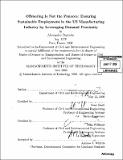Offshoring is not the panacea : ensuring sustainable employment in the US manufacturing industry by leveraging demand proximity
Author(s)
Bartolin, Alexandre (Alexandre Fernand Sauveur)
DownloadFull printable version (29.21Mb)
Alternative title
Ensuring sustainable employment in the US manufacturing industry by leveraging demand proximity
Other Contributors
Massachusetts Institute of Technology. Dept. of Civil and Environmental Engineering.
Advisor
Yossi Sheffi and John Williams.
Terms of use
Metadata
Show full item recordAbstract
This thesis investigates the theme of "manufacturing offshoring" that became a political issue during the 2004 U.S. presidential election. As during previous elections, employment became a key focus on the home front. Whereas the 1992 presidential election was marked by the debate around the loss of manufacturing jobs due to NAFTA, the 2004 election focused on both manufacturing and services jobs lost due to offshoring to low cost countries. For the first time, well paying jobs, such as IT programming, were outsourced to emerging countries like India or China. Offshoring of "white collar" jobs became the focus of academic, consultant, and journalist discussions in U.S., whereas offshoring of manufacturing activities generated comparatively less interest. For decades offshoring of manufacturing activities to low cost countries was used by American companies to either reduce production cost or to avoid high tariffs on exports. Offshoring strategy was historically applied in labor intensive industries, such as the apparel and electronics sectors. On the other hand, the influence of offshoring on high-tech industries was assumed to be limited. However, with the fast technological development of China and India, this paradigm might change quickly. (cont.) This thesis explores the U.S. manufacturing sector by looking at employment and trade data at a macro-level. The terms offshoring and outsourcing will be defined and the main international trade theories discussed. The thesis develops a model to show that offshoring was only a part of the reason for the shrinkage in manufacturing employment between 1997 and 2003; the others being a drop in demand and gains in productivity. After introducing several case studies of companies in the apparel sector and the semi-conductor industry, a framework for understanding the offshoring decision process is developed. This framework defines the conditions needed to make manufacturing in U.S. competitive with production abroad. Finally through a detailed study of the expansion of the Chinese economy and the Wal-Mart phenomenon, the thesis presents the next challenges of the U.S. manufacturing sector: the birth of new competitors for high value added products and the rising constraints on price due to the pressure of retailers on manufacturers.
Description
Thesis (S.M. in Transportation and S.M. in Civil and Environmental Engineering)--Massachusetts Institute of Technology, Dept. of Civil and Environmental Engineering, 2006. Includes bibliographical references (p. 207-216).
Date issued
2006Department
Massachusetts Institute of Technology. Department of Civil and Environmental EngineeringPublisher
Massachusetts Institute of Technology
Keywords
Civil and Environmental Engineering.